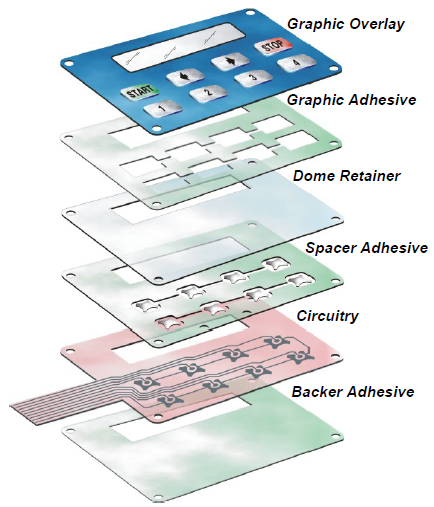Understanding the Value of Membrane Switches in Interface
Membrane buttons are important components in the design of effective user interfaces, helping with not only functionality however also enhancing aesthetic allure and individual communication. As we check out the various benefits and future trends connected with Membrane technology, it comes to be clear that these buttons are more than just elements; they stand for a merging of innovation and functionality.
What Are Membrane Switches?

The spacer layer, which consists of glue homes, permits the splitting up of the circuit layer from the overlay, making certain that the button stays in a non-activated state up until pressed. When stress is put on the overlay, it compresses the spacer layer, bridging the void and completing the circuit in the underlying layer. This layout not only minimizes the physical area required for traditional mechanical buttons yet additionally improves the sturdiness of the tool, as Membrane switches are generally immune to dust, moisture, and various other ecological variables.
Typically discovered in applications varying from consumer electronics to medical gadgets, Membrane switches are important to modern technology, providing a efficient and straightforward user interface that lines up with modern style needs.
Advantages of Membrane Switches
While countless switch technologies exist, Membrane Switches offer unique benefits that make them specifically desirable in different applications. One of the primary benefits of Membrane switches is their portable design, which permits space-saving executions in tools where realty is restricted. Their slim account not just boosts visual charm however additionally promotes light-weight building and construction.
An additional significant advantage is their resistance to ecological elements. Membrane buttons are commonly secured against moisture, dust, and impurities, making them ideal for use in demanding settings, such as clinical devices and industrial tools. This sturdiness expands the life-span of the button, reducing upkeep expenses and improving reliability.
Moreover, Membrane buttons can be personalized to satisfy specific layout requirements, incorporating distinct graphics and shades that enhance individual communication. Their responsive responses options can also be customized to offer a satisfying individual experience. Furthermore, Membrane buttons are affordable, especially in high-volume applications, as they can be created efficiently.
Applications in Various Industries

In the consumer electronics industry, Membrane switches are common in devices such as microwaves, cleaning devices, and push-button controls. Their tactile comments and visual choices enhance individual experience while providing a streamlined, contemporary appearance. Additionally, automotive producers utilize Membrane buttons in dashboard controls and infomercial systems, where room is restricted, and individual interaction is essential.
Moreover, the industrial field leverages Membrane switches in control panels for machinery and equipment, enabling instinctive procedure in frequently severe atmospheres. Their resistance to chemicals and moisture makes sure longevity and reliability in these applications. In general, the flexibility of Membrane Switches adds dramatically to their widespread use, making them essential in different technical domains.
Design Factors To Consider for Membrane Buttons

When creating Membrane buttons, a number of key considerations should be blog thought about to ensure optimal capability and user experience. The selection of materials is crucial; picking long lasting, top quality substratums can boost the switch's long life and resistance to ecological elements such as moisture and temperature level variations.
Secondly, the layout of the graphic overlay need to focus on clarity and convenience of usage. Symbols and message have to be legible, and the layout must facilitate intuitive communication (membrane switches). Additionally, tactile feedback is important; including a tactile dome or other mechanisms can enhance the individual experience by providing physical verification of activation
An additional important factor is the button's electric performance. Designers need to ensure that the conductive traces are appropriately designed to reduce resistance and avoid signal interference. This involves assessing the required actuation force and making certain compatibility with the digital components they will certainly user interface with.

Future Patterns in Membrane Technology
As innovation proceeds to breakthrough, Membrane buttons are poised to progress considerably, driven by innovations in products and producing techniques. One emerging pattern is the consolidation of sophisticated products, such as conductive inks and flexible substrates, which enhance durability and minimize the overall weight of Membrane buttons. These products not only enhance the tactile response yet likewise enable for the design of switches that can stand up to harsher ecological problems.
Moreover, the assimilation of touch-sensitive technologies is changing traditional Membrane Switches into even more interactive interface. Capacitive touch sensors installed within Membrane button panels can offer a more responsive and user-friendly customer experience, straightening with the growing need for streamlined, modern designs in consumer electronics.
In addition, advancements in printing methods, such as electronic and 3D printing, allow fast prototyping and modification of Membrane switches. This adaptability permits makers to respond much more promptly to market needs and customer choices.
Last but not least, sustainability is coming to be a significant focus, with makers checking out eco-friendly products and processes. As these trends unfold, the future of Membrane modern technology promises boosted performance, visual allure, and environmental duty, strengthening their function in innovative user interfaces across different markets.
Conclusion
In verdict, Membrane Switches represent a crucial component in the layout of individual interfaces, incorporating capability with visual adaptability. As advancements in technology proceed, the development of Membrane switches is expected to further improve user this page interfaces, driving advancement and enhancing usability in an increasingly complicated technological landscape.
Membrane buttons are integral elements in the layout of efficient customer interfaces, helping with not just functionality however additionally improving visual charm and customer communication.Membrane Switches offer as a vital part in different individual interfaces, promoting a smooth interaction in between individuals and electronic devices.While many switch technologies exist, Membrane Switches offer unique advantages that make them especially desirable in numerous applications.Furthermore, Membrane buttons can be personalized to meet particular layout requirements, integrating special graphics and shades that enhance customer interaction.In conclusion, Membrane Switches stand for an essential component in the layout of individual interfaces, integrating capability with visual flexibility.
Comments on “Why Membrane Switches Are the Perfect Solution for Industrial Equipment”